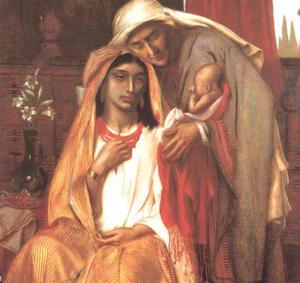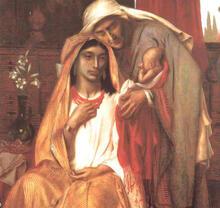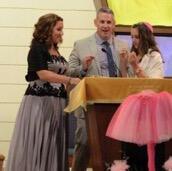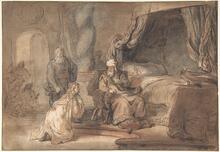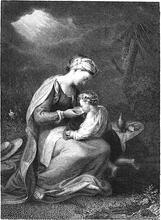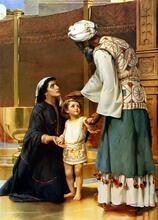Naomi: Bible
Naomi is featured prominently in the Hebrew Bible, and in her stories, she is portrayed as a woman who both challenges and conforms to patriarchal expectations. Over the course of her stories, she has a complicated relationship with God, sometimes blaming God for her issues or concluding that God has forsaken her. Her stories, which appear in the Book of Ruth, concern her struggle to survive with her daughter-in-law, Ruth. Analyses of Naomi from a modern feminist lens include varied interpretations of her actions, but regardless of her position concerning the patriarchy, she dominates the stories in the Book of Ruth and effectively controls the situations of which she is a part.
The Book of Ruth is one of two in the Hebrew Bible that bears a woman’s name (the other is Esther). Ruth depicts the struggles of Naomi and Ruth for survival in a patriarchal environment. Though the story takes its name from the younger woman, the older is the dominant character. Naomi’s plight shapes the narrative, and her plan brings it to resolution.
Marriage and Travels
Scene one (1:1–22) opens with a famine that sends a Judean family across the Jordan to Moab, a foreign land. In introducing the family, the storyteller subordinates Naomi to the man Elimelech. She is “his wife,” and their children are “his sons” (1:1–2) (emphasis added). But his death changes the situation. He becomes “the husband of Naomi,” and she is “left with her two sons” (1:3) (emphasis added). They marry Moabite wives, Orpah and Ruth, but die without progeny. So, Naomi shrinks again. From wife to widow, from mother to no-mother, this woman is stripped of all identity.
Upon hearing that the Lord has restored food to Judah, Naomi begins the journey home. She tells each of her daughters-in-law to return to her “mother’s house” and implores the hesed (“faithfulness” or “loyalty”) of YHWH upon them (1:8–9). Strikingly, the basis on which Naomi invokes divine hesed is the loyalty that Orpah and Ruth have already shown her family. She lifts up these female foreigners as models for what God ought to do. Then she spells out the content of hesed for women who live in a man’s world: to find a home, “each of you in the house of your husband” (1:9). Naomi shapes a theology that paradoxically subverts and serves patriarchy.
When the daughters-in-law insist upon returning with her, she seeks to dissuade them (1:10–13). Using rhetorical questions, she resorts to sound reasoning. She has no sons now in her womb to provide them husbands and no husband to impregnate her. Moreover, she is too old to bear sons, and even if she did, why would these women wait for them to grow up? Describing her situation, Naomi concludes that the Lord has turned against her. The deity whom she hopes will show hesed to her daughters-in-law has shown hostility to her.
Naomi convinces only Orpah; Ruth accompanies her to Bethlehem. When the women of the town focus attention upon Naomi (1:19), she instructs them not to call her “Naomi” (meaning “pleasant”) but instead “Mara” (meaning “bitter”). In a wordplay, she explains the name change by faulting the “Almighty” who has “dealt bitterly with me” (1:20–21). Yet no one ever follows her instruction.
Naomi dominates scene one. Nine times her name appears, most often as the active subject of verbs. Numerous pronouns also attest to her centrality in a time of famine, dislocation, and death—and of return home at the beginning of the barley harvest.
Story with Boaz
Naomi’s prominence continues in scene two (2:1–23). Her name is the first word. It links her to a wealthy kinsman named Boaz. Meanwhile, Naomi grants Ruth permission to glean wherever she is received (2:2). When Ruth finds favor in the field of Boaz, a servant identifies her to him by invoking the name of Naomi (2:6). Boaz also alludes to Naomi as Ruth’s mother-in-law (2:11). In the evening Ruth returns to Naomi, who initiates (2:19) and concludes (2:22) their conversation. Passing judgment on Ruth’s day, Naomi utters words of blessing for the first time (2:19–20). They pertain to the man, as yet unidentified for her, who helped Ruth (2:19). Upon learning that the man is Boaz, Naomi adds the name of the Lord to her blessing (2:20) and so invokes the God whom she has earlier faulted as the giver of bitterness (1:13, 21). Naomi is changing (2:20–22).
As the last to speak in scene two (2:22) and the first to speak in scene three (3:1–18), Naomi continues to direct the plot of the narrative. Not waiting for matters to take their course or for God to intervene, she plans to secure Boaz as husband for Ruth. In seeking security through marriage, her plan fits the strictures of patriarchy, but it departs from them in proposing a dangerous scheme. Naomi tells her “daughter” to dress in fine clothes and visit Boaz in secret at the threshing floor. There she will ask him to make good on his prayer for her blessing (3:3–5). The plan succeeds. The scene ends with the two women discussing the events of the night. Naomi again initiates (3:16) and concludes (3:18) their exchange. From being the receiver of calamity, she has become the agent of change and challenge.
Naomi never speaks again; her work is finished. Nevertheless, she figures prominently in the last scene (4:1–21), her name appearing six times. Boaz depicts Naomi as the owner of property (4:3, 5, 9). The women of Bethlehem invoke YHWH’s blessing upon Naomi through Ruth and the grandchild Ruth bears her (4:14–15). The narrator reports that Naomi embraces the child and becomes his nurse. And at the end, the women even declare that the child has been born to Naomi (4:17).
Analysis
Feminist assessments of Naomi diverge widely, depending often upon the cultural, social, ideological, and experiential biases of readers. A sampling includes the following: Naomi is a cipher for male values that find fulfillment for women in marriage and children. In contrast to the loss of status for childless widows in patriarchy, Naomi achieves importance as a mother-in-law and an independent character. Naomi is an overbearing, interfering, and domineering mother-in-law. Naomi is a caring, gracious, and altruistic mother-in-law. Naomi the Judean rejects Ruth (and Orpah) because she is a Moabite. Naomi embraces Ruth the Moabite within the family of Judah. Naomi and Ruth are rivals, with Naomi eventually achieving the greater prestige. Naomi and Ruth are friends, indeed sisterlike, each seeking the good of the other in a world over which they have little control. Naomi schemes, connives, and manipulates. Naomi plans, reflects, and executes. Naomi is an embittered old woman who denounces God for her troubles but fails to thank the deity when she recovers. Naomi is a profound figure of faith who experiences God as enemy but then wrestles blessing from adversity. All such disparate judgments attest to Naomi’s commanding, if ambiguous, presence in one of the few biblical stories focused on women.
Adelman, Rachel. "Weaving the Messianic Light: Law and Narrative in Making of the Messianic Dynasty.” In The Female Ruse: Women's Deception and Divine Sanction in the Hebrew Bible, 90-121. Sheffield: Sheffield Phoenix Press, 2015.
Frymer-Kensky, Tikva and Tamara Cohn Eskenaz. JPS Bible Commentary: Ruth. Philadelphia: JPS, 2011.
Frymer-Kensky, Tikva. "Royal Origins: Ruth on the Royal Way" and "Royal Origins: The Moabite.” In Reading the Women of the Bible, 238-263. New York: Schocken Books, 2002.
Kalmanofsky, Amy. "Ruth and Naomi." In Dangerous Sisters of the Hebrew Bible, 157-174. Minneapolis: Augsburg Fortress Press, 2014.
Kates, Judith A., and Gail Twersky Reimer, eds. Reading Ruth: Contemporary Jewish Women Reclaim a Sacred Story. New York: 1994.
Lapsley, Jacqueline. “Seeing the Older Woman: Naomi in High Definition.” In Engendering the Bible in a Gendered World, edited by Linda Day and Carolyn Pressler, 102-113. Westminster, 2006.
Levine, Amy-Jill. “Ruth.” Women’s Bible Commentary, edited by Carol A. Newsom and Sharon H. Ringe, 78–84. Kentucky: 1992.
Meyers, Carol, General Editor. Women in Scripture. New York: 2000.
Trible, Phyllis. “A Human Comedy.” In God and the Rhetoric of Sexuality. Philadelphia: 1978.

